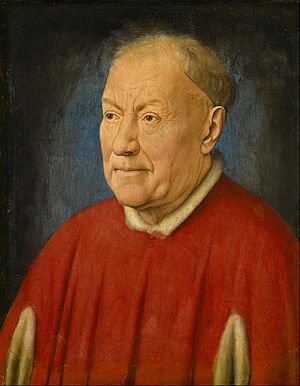Niccolò Albergati facts for kids
Niccolò Albergati (born 1373 – died 1443) was an important Italian church leader. He was a member of the Carthusian Order, a group of monks. He became a cardinal and served as a special diplomat for the Pope in countries like France and England.
He was also the bishop of Bologna from 1417 until he passed away. Even though he didn't want to be a bishop at first, he did his job very well, focusing on education. He was highly respected by two popes, Pope Martin V and Pope Eugene IV, who gave him important jobs. He played a big part in important church meetings, like the Council of Basel-Ferrara-Florence.
Two of his students, Tommaso Parentucelli and Enea Silvio Bartolomeo Piccolomini, later became popes themselves! Tommaso Parentucelli even chose the name "Nicholas" when he became pope, to honor his teacher. Niccolò Albergati was later recognized as "Blessed" by the Church in 1744.
Quick facts for kids Blessed Niccolò Albergati OCart |
|
|---|---|
| Bishop of Bologna | |

Portrait by Jan van Eyck, c. 1431-1435
|
|
| Church | Roman Catholic Church |
| Diocese | Bologna |
| See | Bologna |
| Appointed | 5 January 1417 |
| Enthroned | 4 July 1417 |
| Reign ended | 9 May 1443 |
| Predecessor | Giovanni Di Michele |
| Successor | Tommaso Parentucelli |
| Other posts |
|
| Orders | |
| Ordination | June 1404 |
| Consecration | 4 July 1417 by Tommaso Perenduli |
| Created Cardinal | 27 May 1426 |
| Rank | Cardinal-Priest |
| Personal details | |
| Birth name | Niccolò Albergati |
| Born | 1373 Bologna |
| Died | 9 May 1443 Siena |
| Previous post |
|
| Alma mater | University of Bologna |
| Sainthood | |
| Feast day | 9 May |
| Venerated in | Roman Catholic Church |
| Beatified | 25 September 1744 Rome by Pope Benedict XIV |
Contents
Life Story of Niccolò Albergati
Early Life and Becoming a Priest
Niccolò Albergati was born in 1373 in Bologna, Italy. His father, Pier Nicola Albergati, was an important person in the city.
Niccolò first studied law at the University of Bologna starting in 1386. After that, he began his studies to become a priest. In 1394, he joined the Carthusians, a religious order. He officially became a member of the order in 1396 at a monastery near Florence.
He took his first steps towards priesthood in 1403. He became a deacon in 1404 and was ordained as a priest in June 1404. By 1407, he was chosen to lead the San Girolamo di Casara monastery. In 1412, he was put in charge of all Carthusian monasteries in Italy.
Becoming a Bishop
On January 4, 1417, a group of leaders in Bologna decided that Niccolò should be the next bishop of Bologna. He didn't want the job at first. He accepted it only because he felt it was his duty to the Church and the Pope.
He officially became a bishop on July 4, 1417, in a special ceremony. After this, he immediately started working to make Bologna a center for learning and humanism. Pope Martin V officially approved his appointment in 1418.
Niccolò faced some challenges in Bologna. There were rebellions against the Pope's rule in the city. This forced him to leave Bologna twice, but he always returned.
In 1422, he was sent as a special diplomat, called a nuncio, to England and France. His mission was to help these two kingdoms make peace. He returned in 1423 after his important diplomatic work.
Becoming a Cardinal
Because of his success, Pope Martin V made Niccolò a cardinal on May 24, 1426. He was given the title of Cardinal-Priest of Santa Croce in Gerusalemme.
As a cardinal, he took part in the election of the next pope in 1431. This election chose Pope Eugene IV. The new pope also trusted Niccolò greatly. He sent Niccolò as a special representative, or legate, to important Italian cities like Florence, Milan, and Venice.
Niccolò was a skilled diplomat. He helped solve disagreements between powerful leaders and the Pope. He also played a key role in the Congress of Arras in 1435. This meeting tried to bring peace between England and France. While it didn't fully succeed, it did help make peace between the Duke of Burgundy and the King of France.
He was also involved in major church meetings, including the Council of Basel-Ferrara-Florence. He helped open the Council of Florence, which aimed to unite the Latin and Greek Churches for a short time.
Teaching and Mentoring
Niccolò Albergati was a great teacher. Two of his most famous students, Tommaso Parentucelli and Enea Silvio Bartolomeo Piccolomini, both went on to become popes!
Niccolò had ordained Tommaso Parentucelli as a priest. He had such a strong influence on Tommaso that when Tommaso became pope, he chose the name "Nicholas" in honor of his mentor. Niccolò also wrote several books on religious topics and encouraged learning in his diocese.
His Passing
Niccolò Albergati passed away on May 9, 1443, in Siena. He had been traveling with the Pope when he became very ill with kidney problems. His health worsened, and he died at an Augustinian monastery.
Pope Eugene IV led his funeral on May 11. Niccolò was buried in a monastery in Florence. Later, in 1633, his remains were examined. It was found that his brain was still intact, and it was then sent to Bologna.
Recognized as Blessed
Niccolò Albergati was officially recognized as "Blessed" by Pope Benedict XIV on September 25, 1744. This happened because people had long shown great respect and veneration for him after his death.
See also
- Portrait of Cardinal Niccolò Albergati
- Study for Cardinal Niccolò Albergati

